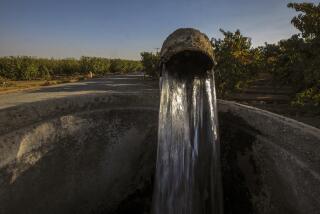A heartfelt plea for a sensible water policy
To everything there is a season; but water is eternal. Or it was, until we started disturbing its natural rhythms. We penned it behind dams and diverted it to aqueducts, starving the life out of rivers and creating an unsupportable addiction to using more water than we need to live.
Despite the looming crisis in water, we have enough to live on, but not enough to waste. And waste it we have, with great enthusiasm for lush green lawns in a desert and a penchant for backroom deals with agribusiness. These deals end up as sweetheart ones for the moneyed corporate farmers, providing them with essentially a bountiful private water supply, which they sell off at a profit, while the rest of us are carefully metered and potentially rationed.
I have spent more than 30 years fighting for clean water and a sustainable supply for California. As this is being written, I am bedridden, under hospice care. I am making one last plea for common-sense management of our water supply in a manner that protects public health and the environment while sustaining business and agriculture.
How? The state Water Resources Control Board already has the authority -- legal and regulatory -- to manage the state’s water resources. But it hasn’t been doing so. For example, it has issued from five to seven times the amount of water rights than there is available water. It is also responsible for water rights and quality in the Sacramento-San Joaquin River Delta, yet 10 sewage treatment plants in the delta area discharge treated wastewater that contains large amounts of pollutants into the water supply.
The board should be depoliticized and sufficiently funded so that it can do its duty effectively. It should create a sustainable water plan that has teeth, with bipartisan support from the governor and the Legislature. This is how to make this happen:
* Create an independent structure for water rights: a water court comprising three appointed administrative law judges who specialize in water rights to handle those disputes before the board. Their decision-making must be consistent with applicable law, but there should be a mandate that they allocate water according to the actual availability of supply in the state. They also should review past water-rights decisions to bring them in line with existing supplies.
* The board should develop a sustainable water plan with accountability. Enforcement mechanisms would include financial penalties and operating restrictions for wayward agencies. There also should be an independent and public biennial assessment of the plan’s implementation.
* The sustainable water plan should include an allocation of water rights based on available supply; a ban on discharging wastewater into our drinking water supplies unless it meets Title 22 public health standards for water recycling (similar to drinking water standards); meter every water use, including agriculture, not just those of urban dwellers; mandate use of recycled water throughout the state; mandate low-impact development for all projects, including transportation, in order to capture storm water on-site to replenish local groundwater aquifers; and fast-track a groundwater cleanup program.
* Develop a steady revenue stream to support the water-rights court and the board. The funding must not be dependent on the general fund budget. There are a number of fees that support the board, but they are not enough. Additional funds should come from water supply agencies based on their water usage.
* Do not approve a deal for a new water bond until these changes have been put in place. Although past bonds have done some good, they haven’t helped us face the increasing water scarcity caused by climate change and increasing population.
The time for consensus and compromise has long passed. If there is one thing I’ve learned in my lifetime of activism, change doesn’t come easily, but without it, the environment will continue to degrade along with our quality of life. Don’t allow our water future to be decided by special interests. Anne Frank said, “How wonderful it is that nobody need wait a single moment before starting to improve the world.” I agree. Let’s start now.
Dorothy Green is founding president of Heal the Bay, the Los Angeles/San Gabriel River Watershed Council and a founder of the California Water Impact Network.
More to Read
Sign up for Essential California
The most important California stories and recommendations in your inbox every morning.
You may occasionally receive promotional content from the Los Angeles Times.









